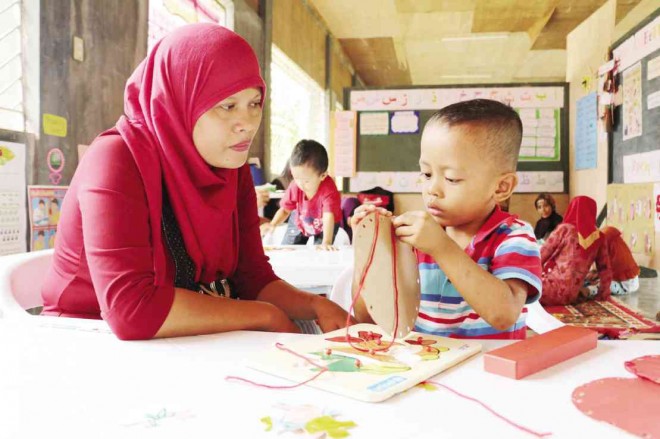
EVELYN Sacurat observes her 3-year-old son, Rainier, accomplish a learning exercise at the newly established Australian government-assisted Tahderiyyah on Durian Avenue, Barangay Madaum, Tagum City. KENNY NODALO/ CONTRIBUTOR
TAGUM CITY—Evelyn Sacurat sends her 3-year-old son, Rainier, to a Tahderiyyah (Islamic nursery school) in Barangay Madaum here, believing that the child will be better off in a preschool for Muslim children than in a regular nursery school.
“What I like about the Tahderiyyah school is that my son gets to learn about our religion and the regular subjects at the same time. It is important that our children learn the teachings of the Koran at an early age,” she said.
Tagum City is host to seven Tahderiyyah centers, which include Madrasato Hudha Al-Islamiyah, Madrasa Maahad Davao Al-Islamie and Durian Avenue Tahderiyyah Learning Center, among others.
The Tahderiyyah is part of the peace and development programs in Mindanao that are being supported by the Australian government through the United Nations Children’s Fund (Unicef).
Communiqué
In April 2007, the Moro Islamic Liberation Front (MILF) and Unicef signed a joint statement calling for “deliberate and extraordinary efforts to provide services for children in conflict-affected communities in Mindanao.”
The signing became the precursor of the Tahderiyyah implementation in Mindanao where more than 800 Tahderiyyahs were established since 2007. Unicef’s Tahderiyyah program is anchored in the principles of Republic Act No. 8980, or the Philippine National Early Childhood Care and Development Act of 2010, which promotes children’s rights to survival, special protection and full recognition of their special needs.
The program enables children in targeted Bangsamoro communities to enjoy their right to culturally responsive early childhood care and development (ECCD), which is composed of three complementary pillars: water, sanitation and hygiene (WASH) and child protection.
Unicef, in partnership with the Bangsamoro Development Agency (BDA), developed a curriculum and teaching methodologies to ensure that the Tahderriyyah remains responsive to specific needs of young children.
The program also provides a healthier learning environment by investing in better WASH facilities and in promoting efforts to strengthen child protection mechanisms especially during armed conflicts.
Targets
Unicef also established 200 Tahderiyyah centers under the early childhood education component of the Australian government-funded Basic Education Assistance for Mindanao in the Autonomous Region in Muslim Mindanao (BEAM-ARMM), a comprehensive education and youth development program that contributes to the alleviation of poverty and sustainable peace in the ARMM through investments in basic education.
The program has served more than 8,000 children in the region. It also trained 285 “asatidz” or madrasah (Arabic schools) teachers and 248 school administrators called “mudeers.”
Counselor Robyn Biti of the Australian embassy in the Philippines, who came here recently, said Australia shared the Philippine government’s aspirations of a peaceful, safe and fruitful life for schoolchildren in Mindanao.
“We sincerely hope that the work that you (community) are doing here will set your children on a path to a bright and very promising future,” she said.
Sacurat said her son loved to listen to stories that taught morals and Islamic values during his class.
“More than his academic studies, I want him to become a better Muslim in the future,” she said.
(Editor’s Note: Contributor Kenny Nodalo is a staff member of the Australian government-funded Basic Education Assistance for Mindanao in the Autonomous Region in Muslim Mindanao, or the BEAM-ARMM program.)